Santa Cruz II Galapagos Vessel
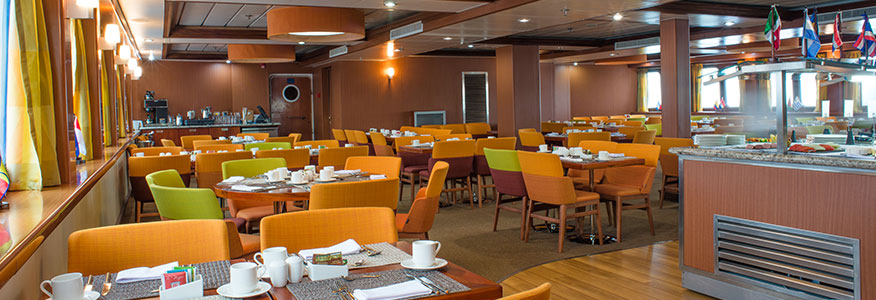
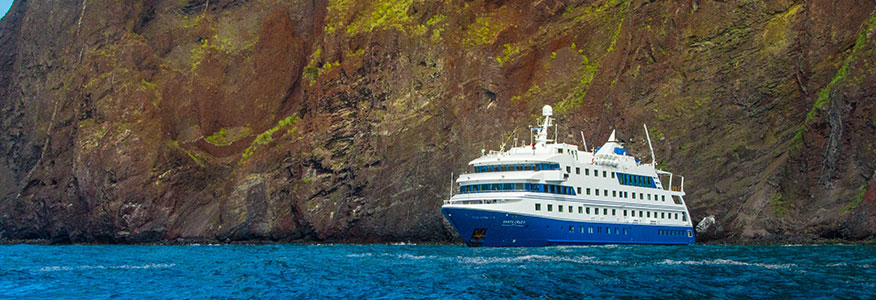
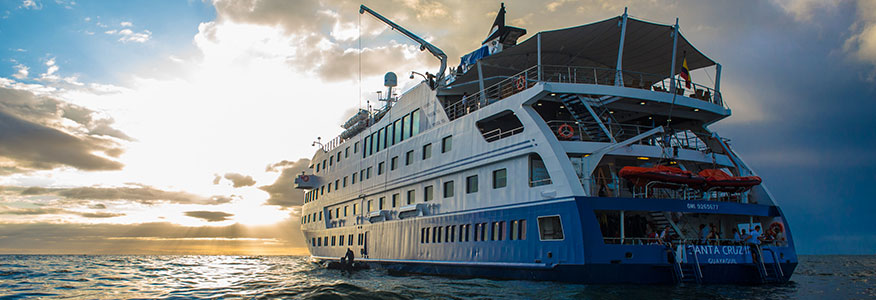
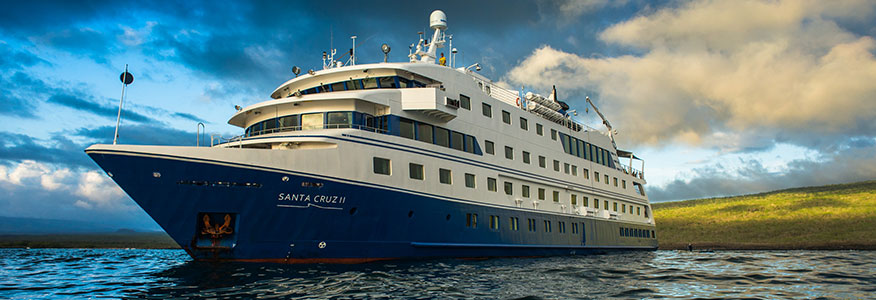
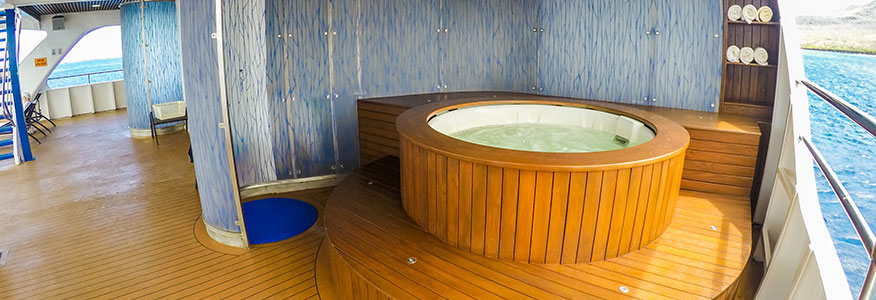
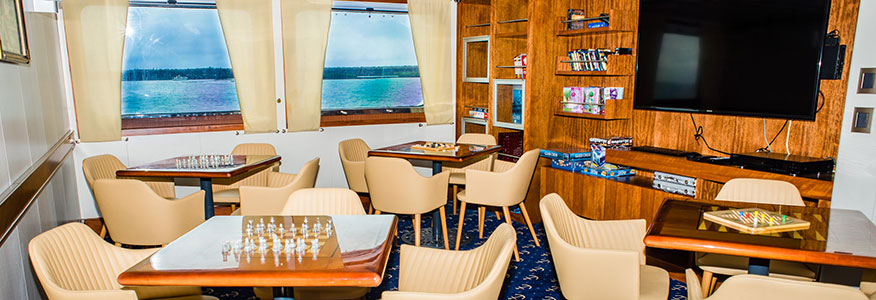
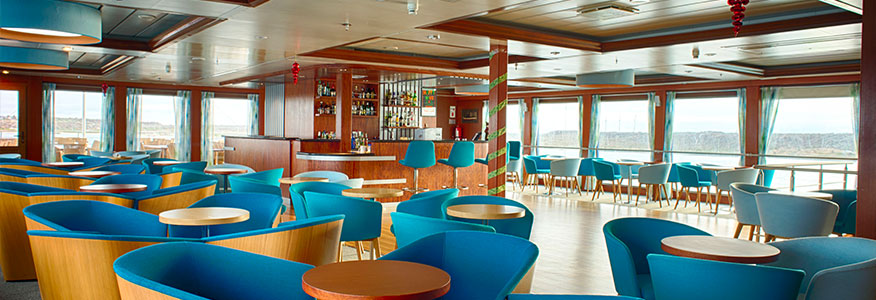
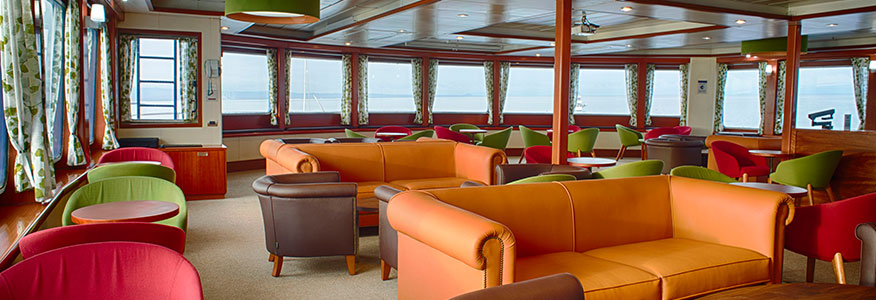
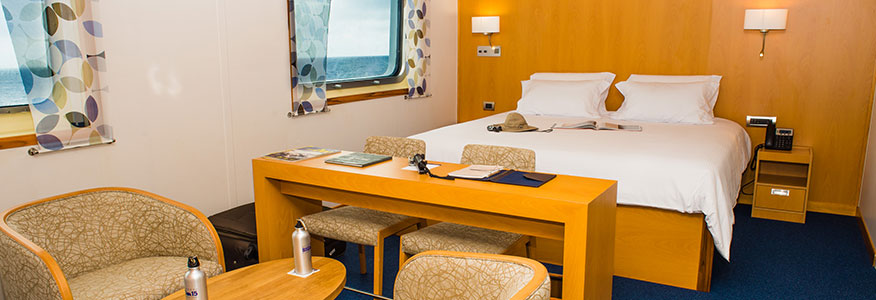
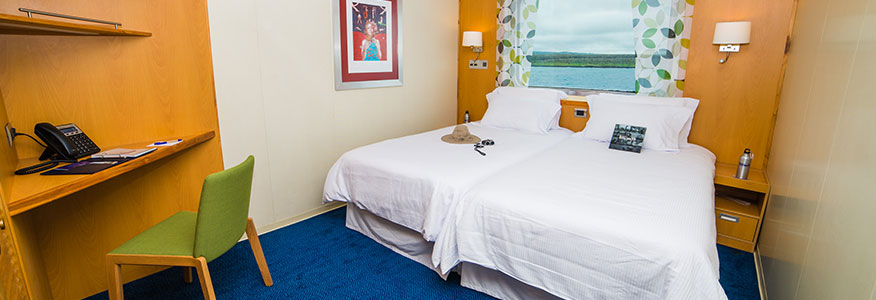
Santa Cruz II Galapagos Vessel
The new boat will sleep 90 guests in 50 contemporary designed cabins across three decks. Guests can choose from luxuriously appointed single, double and triple cabins, or opt for one of the three even more exclusive Darwin Suites, an exceptional standard of accommodation on the Panorama Deck, where guests will receive elevated service and carefully refined extras such as a take-home Galapagos coffee table book, a tablet loan for each cabin, complimentary drinks and VIP lounge access at the Galapagos Islands airport.
While aboard the new Santa Cruz II, guests can relax in the beautifully designed communal areas and viewing platforms, including indoor and outdoor dining options, two lounge bars, a well-stocked library, two indulgent ocean view hot tubs and a state of the art gym.
- Day 1: Monday
Baltra Island
We land at Baltra Island by plane in the morning and transfer to the dock to board the Santa Cruz II, where we receive a welcome introductory briefing, boat drill and lunch.
Las Bachas (Santa Cruz Island)
This beautiful visitor site is located on the north shore of Santa Cruz Island, a glorious white beach with a couple of brackish lagoons only a few steps away from the sea. These lagoons are the feeding grounds of various wading birds, from stilts to flamingos. You may enjoy swimming and or snorkelling at this beach too. Welcome cocktail, expedition plan for Tuesday and dinner.
- Day 2: Tuesday
Buccaneer Cove (Santiago Island)
After breakfast, we explore the coastline along the impressive cliffs of Buccaneer Cove, learning about the area’s distant and recent history. The cove is home to a large number of marine birds, sea lions, and inter-tidal organisms. Enjoy fantastic natural formations such as the “Elephant Rock”, “The Bishop” and an impressive natural cave. Opportunity for snorkelling, and a ride on the panga or glass-bottom boat.
Puerto Egas (Santiago Island)
Once we disembark at the beach, we can enjoy a swim or snorkel amid a rocky shoreline, usually in the company of marine turtles. From here, we head off to our walk, a great opportunity to see land and marine birds amid landscape of tuff-stone layers and lava flows. At low tide, marine iguanas graze upon the algae beds and we can also observe a colony of fur seals. After the visit, we had some time for swimming and snorkeling.
- Day 3: Wednesday
Rabida Island (Jervis)
Some groups will go for a fascinating panga ride along the shores while others will disembark on Rabida Island’s red-coloured beach, caused by the unusually high content of iron in the volcanic material. Our walk brings us close to a colony of sea lions, marine iguanas, mockingbirds, yellow warblers and several species of Darwin’s finches. Very close to the beach, a salt pond occasionally hosts American flamingos. This is a great place to snorkel from the beach, both for beginners as well as for experienced snorkelers, due to the unique combination of underwater species and submarine landscapes. During navigation to our next island, we can sometimes spot dolphins!
Bartolome Island
Today’s afternoon activities begin with a wet landing on the golden beach of this famous island, dominated by the imposing Pinnacle Rock. There’s great snorkeling and swimming from the beach plus the chance to ride the glass bottom boat. After returning to the ship, we split into two group: the first lands for a hike to the summit of this diminutive island that boasts fantastic views of the archipelago. This is a moderately steep climb aided by a wooden staircase, resting platforms and handrails – the view from the top is worth the effort! The second takes to the pangas to explore the rugged and volcanic shoreline. The groups then swap so that each one experiences the full beauty of this island.
- Day 4: Thursday
Prince Philip Steps (Genovesa Island)
The morning starts with a steep climb (only 90 feet) up some stairs to reach a flat rocky plateau. Along our walk, we can observe large colonies of Nazca boobies, red-footed boobies, great frigate birds and storm petrels. Those not wishing to disembark can enjoy a longer panga ride along the cliffs (depending on weather conditions). Kayaking is optional.
Darwin Bay (Genovesa Island)
In the afternoon, we land at this beautiful beach to enjoy some swimming and/or snorkeling. Following our dip, we take an easy stroll to observe hundreds of birds, mainly frigate birds, red-footed and Nazca boobies, gulls, herons, finches and mockingbirds. Opportunity for snorkeling, kayaking and swimming.
- Day 5: Friday
Tortoise Reserve – Baltra airport
We start our last morning at the north shore of Santa Cruz Island. After breakfast, your luggage will be taken to the airport, while you visit the Tortoise Reserve. A dry landing at a passenger’s wharf and a bus ride to the loftier region of the island will provide the last highlight of the cruise: giant tortoises in the wild. The windward slopes of the island are home to two species of giant tortoises. These lush highlands include dense forests of Galapagos daisies, orchids and bromeliads, and several endemic land birds. After this visit we will transfer directly to Baltra airport. Farewell to Galapagos
- Day 1: Thursday
Baltra Island
We arrive by plane at Baltra Island and transfer to the dock to board the Santa Cruz II where we receive our welcome introductory briefing, boat drill and lunch.
Cerro Dragon (Dragon Hill) (Santa Cruz Island)
The north shore of Santa Cruz hosts the fascinating landscapes of Cerro Dragon (Dragon Hill). The first part of our walk passes a brackish-water lagoon frequented by shorebirds, ducks and flamingos, while further inland, the trail offers a beautiful view of the bay and the western islands of the archipelago, as well as the chance of observing land iguanas.
- Day2: Friday
Punta Vicente Roca (Isabela Island)
After breakfast, we explore the coast by panga, while our naturalist guide explains the dramatic geology of the area, a nesting place for several Galapagos highlights: flightless cormorants, Galapagos penguins, fur seals, boobies, etc. Depending on weather conditions, we can snorkel along the cliffs of this area rich in marine life, seasonally-visited by green sea turtles and oceanic sun fish (Mola mola)
Punta Espinoza (Fernandina Island)
The afternoon is dedicated to exploring the youngest island of the archipelago, Fernandina, which, having no introduced mammals, boasts a very unique environment with a very high density of marine iguanas, who share their space with sea lions, Sally light-foot crabs, hawks, penguins and the flightless cormorants.
- Day 3: Saturday
Puerto Ayora and the Charles Darwin Research Station (Santa Cruz Island)
In the morning, we disembark (dry landing followed by a brief bus ride) for our visit to the Charles Darwin Research Station’s giant tortoise Breeding Centre within an impressive giant prickly-pear cactus forest, home to many land birds. These are the headquarters of scientific investigation, conservation and the National Park administration. Following our visit, we board our transport to enjoy lunch in the cooler highlands of Santa Cruz Island, a completely different ecosystem.
Santa Cruz Island
We have several options available for the afternoon, which can be discussed in advance with your Expedition Leader. Options include beach walks, kayaks, walks along the tortoise reserve, etc. At the end of the afternoon’s activities, we return to Puerto Ayora and embark on the Santa Cruz II.
- Day 4: Sunday
Baroness Tower – Post Office Bay (Floreana Island)
After breakfast, panga ride along the maze of channels on Floreana’s north shore can be enjoyed. We follow this visit by continuing to Baroness Cove with its breathtaking views of Floreana. We land at Post Office Bay to visit the historic barrel that has served as a post office in the archipelago for over two centuries and where postcards are traditionally left for guests from other vessels to hand-deliver to their destinations. Snorkelling off the beach. We then head back on board for lunch.
Champion Islet – Punta Cormorant (Floreana Island)
Following lunch and a siesta, we take the pangas and glass-bottom boat to explore the underwater wonders around Champion Islet, an extinct shield volcano, regarded as one of the best snorkelling spots in the archipelago. From there, it’s on to Punta Cormorant, beginning with a wet landing on the olivine-crystal beach for an easy walk that includes a brackish-water lagoon where bird species such as American flamingos, pintail ducks, common stilts, herons, sandpipers, and others gather. We continue our walk over to a white-sand beach, where sea turtles emerge from the sea at night to nest (from December to May).
- Day 5: Monday
Baltra Island
We disembark at Baltra Island in order to transfer to the airport to take the flight back to the mainland..
- Day 1: Friday
Baltra Island
We arrive by plane at Baltra Island and transfer to the dock to board the Santa Cruz II where we receive our welcome introductory briefing and lunch.
Mosquera
After lunch and your introductory briefing on board, Santa Cruz II will relocate only four nautical miles from Baltra, next to Mosquera Islet, a small volcanic uplift between Baltra and North Seymour. The island is a long and narrow sand bank surrounded by lava reefs. Our groups will approach the island from its western shore, a long shallow reef, the perfect rookery for young sea lions. After a wet landing, our guides will lead you past the sea lion colonies, where you will learn more about the fragile marine and terrestrial ecosystems of Galapagos. The walk is easy as it is restricted to a few hundred metres of flat sandy dunes. This will also be a great opportunity for an introduction to snorkelling.
- Day 2: Saturday
Puerto Baquerizo Moreno (San Cristobal Island)
After breakfast, we disembark (dry landing) at Puerto Baquerizo Moreno, the island’s capital, and drive 40 minutes to the island’s southern shore. At Cerro Colorado, we visit the breeding centre for highly endangered giant tortoises in the midst of a fantastic deciduous forest, home to dozens of bird species, including the San Cristobal mockingbird, and the San Cristobal lava lizard, both island endemics.
Punta Pitt (San Cristobal Island)
In the afternoon, we disembark (wet landing) on the eastern tip of the island at Punta Pitt, an eroded tuff cone, whose trail provides spectacular views of the shoreline. This is the only site in the Galapagos where the three species of boobies can be found together. We can walk or enjoy a panga ride along the coast. Opportunity for snorkelling, swimming and kayaking.
- Day 3: Sunday
Santa Fe Island
After breakfast, we take the dinghy over to this idyllic sandy-white beach populated by many sea lions (wet landing). The endemic land iguana, unique to this island, may be spotted during the morning walk amid the giant prickly pear cactus. Snorkelling and swimming from the panga rounds off our rewarding experience, or if guests prefer, the glass bottom boat is available for non-snorkelers. Opportunity for kayaking.
South Plaza Island
Following lunch and a rest, we disembark (dry landing) in this channel, whose turquoise waters contrast brilliantly with the white sand and black lava of the shoreline. Beyond, a carpet of scarlet sesuvium succulents serves as groundcover for a grove of luminescent green prickly-pear cactus. Yellow-grey land iguanas sit beneath these, waiting patiently for pears to drop. Along the coastline one finds sea lion colonies, while frigates, swallow-tailed gulls and shearwaters glide, playing with the thermals.
- Day 4: Monday
Puerto Ayora and the Charles Darwin Research Station (Santa Cruz Island)
In the morning, we disembark (dry landing) for our visit to the Charles Darwin Research Station’s giant tortoise Breeding Centre within an impressive giant prickly-pear cactus forest home to many land birds. These are the headquarters of scientific investigation, conservation and the National Park administration. Following our visit, we board our transport to enjoy lunch in the cooler highlands of Santa Cruz Island, a completely different ecosystem.
Santa Cruz Island
We have several options available for the afternoon, which can be discussed in advance with your Expedition Leader. At the end of the afternoon’s activities, we return to Puerto Ayora and embark on the Santa Cruz II.
- Day 5: Tuesday
Punta Suarez (Española Island)
(Dry landing) – An exciting walk awaits at this site, where we enjoy its unique sea bird colonies, including Galapagos albatross (April-December), Nazca boobies, blue-footed boobies, and swallow-tailed gulls as well as a view of the Galapagos’ famous “blow-hole”. Also, look out for red-green-black marine iguanas. Back on board for lunch.
Gardner Bay – Osborn Islet (Española Island)
(Wet landing) In the afternoon, the picture-postcard white coral beach of Gardner Bay and the nearby islet of Osborn provides a beautiful setting for observing sea lions, mockingbirds, and finches as we relax. We can expect great snorkelling in this area. Opportunity for swimming and kayaking as well.
- Day 6: Wednesday
Eden Islet (Santa Cruz Island)
After breakfast, a panga ride takes us to Eden Islet, a small islet located off the coast of Santa Cruz, where we can observe blue-footed boobies diving into the water, reef sharks and frigates. There’s a chance to snorkel and, if weather condition permits, ride in the glass-bottom boat and kayak.
North Seymour Island
North Seymour was lifted from the ocean floor by a volcanic event, and its origins as a seabed give the island its low, flat profile. A tiny forest of silver-grey Palo Santo trees stands just above the landing (dry landing), usually without leaves, waiting for the rains to burst into bloom. This is a great introductory site to the islands and their wildlife, full of bird colonies of blue footed boobies, two species of frigate birds, swallow-tailed gulls, as well as sea lions and marine iguanas.
- Day 7: Thursday
Baltra Island
On our last day, we disembark at Baltra Island and transfer to the airport to take the flight back to the continent.
M/V Santa Cruz II (2019 prices) |
NORTHERN MON / FRI 5D/4N |
WESTERN THU / MON 5D/4N |
EASTERN FRI/THU 7D / 6N |
|---|---|---|---|
| Horizon Deck Family Explorer (2) | $3.664 |
$3.664 |
$5.358 |
| Horizon Deck Explorer Cabin (23) | $3.896 |
$3.896 |
$5.700 |
| Horizon Deck Voyager Cabin (2) | $4.496 |
$4.496 |
$6.576 |
| Expedition Deck Explorer Cabin (17) | $4.056 |
$4.056 |
$5.928 |
| Panorama Deck Explorer Cabin (3) | $4.172 |
$4.172 |
$6.102 |
| Panorama Deck Darwin Suite (3) | $4.728 |
$4.728 |
$6.818 |
M/V Santa Cruz II (2020 prices) |
NORTHERN MON / FRI 5D/4N |
WESTERN THU / MON 5D/4N |
EASTERN FRI/THU 7D / 6N |
|---|---|---|---|
| Horizon Deck Family Explorer (2) | $3.822 |
$3.822 |
$5.264 |
| Horizon Deck Explorer Cabin (23) | $4.066 |
$4.066 |
$5.600 |
| Horizon Deck Voyager Cabin (2) | $4.690 |
$4.690 |
$6.458 |
| Expedition Deck Explorer Cabin (17) | $4.230 |
$4.230 |
$5.822 |
| Panorama Deck Explorer Cabin (3) | $4.350 |
$4.350 |
$5.996 |
| Panorama Deck Darwin Suite (3) | $4.930 |
$4.930 |
$6.794 |
Sky Deck

Horizon Deck

Panorama Deck

Expedition Deck

Ocean Deck

Specifications
| Refurbishment: |
|
| Construction: |
|
| Gross Tonnage: |
|
| Passenger Space Ratio: |
|
| Type of Vessel: |
|
| Capacity: |
|
| Length: |
|
| Beam: |
|
| Speed: |
|
| Electricity: |
|
| Engines: |
|
| Fire Detector: |
|
| Life Jackets: |
|
| Life Rafts: |
|
| Landing Boats: |
|
| Decks: |
|
| Crew: |
|
| Naturalist Guides: |
|
| Guest-Crew Ratio: |
|
| Medical Officer: |
|
| Certifications: |
|
Inclusions:
Exclusions:
Important Observations
(See POLICIES for booking, payment and cancellation policies for FITs and GROUPS)
During Peak Season: Dec 21-25 / Dec 23-29 / Dec 28-Jan 1 / Dec 30-Jan 4 / Jan 1-5*
- There will be a surcharge of US$ 150 per adult and US$ 110 per child
- No discounts apply
- Twin / Double Cabins for single use have a surcharge of 100%
- Children policy does not apply during high season
Children Policy:
- Children under 12 sharing a cabin with their parents or guardians: 25% off. (Applies only to one child per adult paying full fare).
- Minimum age 6 years old
- Children's policy does not apply on especific dates.
Contact Us
Sponsor Spotlight
M/Y Stella Maris
Galapagos luxury yacht charters, offering upscale cruises in a unique wildlife destination.
Exclusive Galapagos Cruises
Exclusive Galapagos Cruises
Machu Picchu Inc


